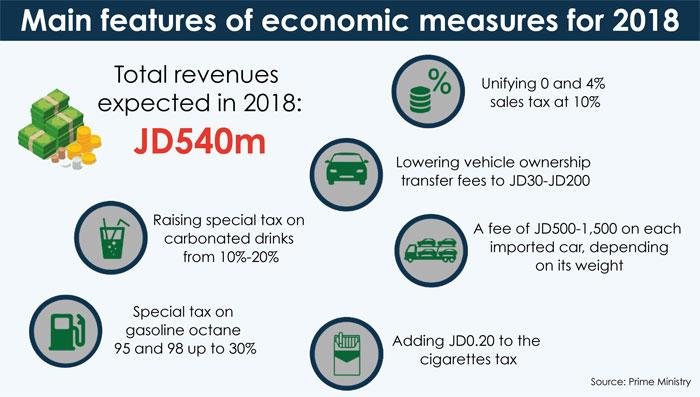You are here
Government announces economic measures, cash subsidy mechanism
By JT - Jan 16,2018 - Last updated at Jan 16,2018

AMMAN — The Cabinet on Monday set JD26.4 as the per capita annual support to offset the impact of lifting the bread subsidy, the Jordan News Agency, Petra, reported, citing a Cabinet statement.
At a meeting chaired by Prime Minister Hani Mulki, the Cabinet set the threshold annual household income for the segments eligible for the cash support at JD12,000, while individuals who apply for the subsidy should prove that their yearly income does not exceed JD6,000.
For beneficiaries from the National Aid Fund (whose number is around 340,000), the per capita value of the cash subsidy is JD33, while children of Jordanian women married to non-Jordanians and residents who come from Gaza Strip are eligible to receive the JD27, if they meet the conditions applied to Jordanians.
The council called on citizens to post their applications at www.da3mak.jo, announcing that so far 230,000 families have registered as beneficiaries.
The 2018 draft state budget includes, for the first time, a social safety network/cash subsidy with a value of JD171 million to make up for rising cost of living brought by lifting subsidies on bread and other commodities, whose sales tax is below 16 per cent with a list of exceptions announced by the Cabinet. The Cabinet, according to Petra, said the net would cover 6.2 million Jordanians, out of 7.8 million citizens, while the rest of around 10 million are non-Jordanians.
The government’s statement detailed how the cash would be delivered to beneficiaries and how applicants, who are excluded from the support, can contest the decision.
According to an infograph provided by the Cabinet, the total revenues expected from the corrective measures amount to JD540 million plus, which will be generated from lifting the bread subsidy and levying JD500-1500 on each importing car, depending on its weight, while vehicle ownership transfer fees will be reduced to range from JD30-200. Meanwhile, the government has raised the special tax on carbonated drinks from 10-20 per cent, and on Octane 95 and 98 gasoline to 30 per cent while JD0.20 has been added on cigarette packets, while all sales tax exemptions (zero and 4 per cent) have been modified at a unified rate of 10 per cent.
The reduced taxes on essential commodities remain unchanged, including sugar, rice, flour, cooking oil, lamb, beef, chicken, fish, fresh milk, children’s milk, eggs, tea, school stationery, pesticides, fertilisers and veterinary medicines, in addition to equipment used by disabled persons for mobility and orthopedic devices.
Petra reported that the estimated per capita consumption of bread and the items whose sales tax was raised is JD13.4 monthly after the subsidies have been removed, up from JD11.2 before the decision. The difference, JD2.2, will be paid to the deserving segments of the society, totalling JD26.4 per individual per year.
The Cabinet’s statement noted that the government has allocated JD25 million in 2018 to increase support for the National Aid Fund (by JD10 million), the civil and military consumer outlets (JD10 million), and school nutrition programme (JD5 million).
It also highlighted other previously announced decisions including the age segment (60-69) to the free medical insurance and keeping electricity subsidy for households that consume less than 300km/h a month, among other measures to mitigate the impact of the new changes.
Related Articles
AMMAN — Jordanian households will need to spend 10-15 per cent extra to maintain the level of their living standards prior to the recent gov
AMMAN — The Cabinet on Wednesday approved the disbursement of direct cash support (bread subsidies) for 2019 beneficiaries.
AMMAN — The Cabinet on Monday announced that the cash subsidy will be dispensed to eligible beneficiaries in the last week of this month.















